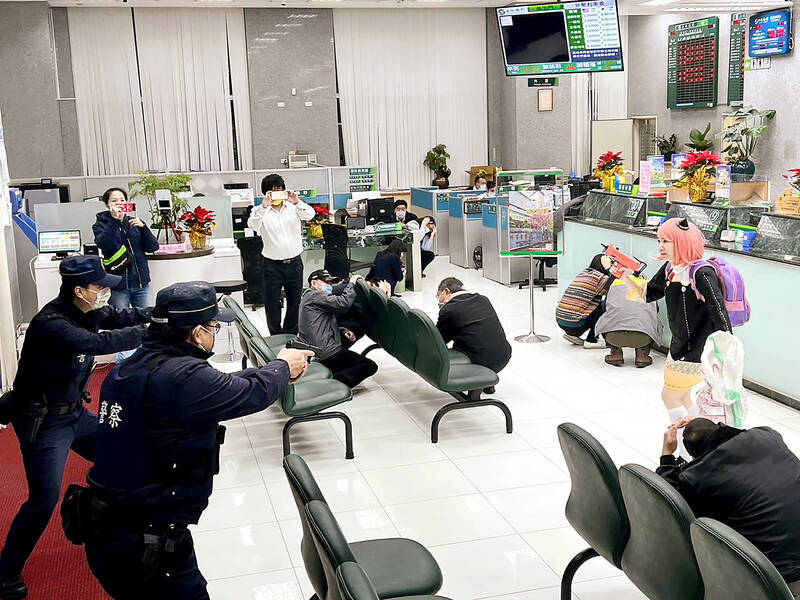The National Police Agency has finished installing its first virtual reality (VR) police training systems at seven police departments and institutions across Taiwan to prepare police officers for tense situations in the line of duty.
The VR systems were installed at the New Taipei City, Taoyuan, Kaohsiung and Chiayi County police departments, as well as the Railway Police Bureau, the Taiwan Police College and the First Police Special Corps 6th Corps at the end of last year, costing NT$45 million (US$1.48 million), the agency said.
Although some local police forces had acquired augmented reality (AR) immersive police training systems under a special project launched in 2020, the VR training systems are the first of their kind in Taiwan and offer new training features, the agency said.

Photo: CNA
They require users to wear headsets, while the AR systems, which use projection screens, do not, enabling the simulation of different settings, including karaoke bars, concourses, train carriages and checkpoints.
Through such simulations, officers are trained to be more aware of their surroundings, while having the opportunity to practice their skills and become more familiar with situations that require them to use weapons, which would improve their performance in a crisis, it said.
Trained officers can be prepared for a wide range of scenarios, such as when faced with provocations, threats, attempts to flee or attacks by a suspect, in which they have to respond quickly and appropriately, it said.
The system also enables officers to simulate talking with suspects, choosing from different types of police weapons and deciding when to fire a gun, and it even has a “multiplayer” mode in which multiple officers can train at the same time to provide “backup” for their colleagues.
The renewed emphasis on training for police officers to handle unexpected situations or crises comes after the death of railway police officer Lee Cheng-han (李承翰).
Lee was stabbed in 2019 at the Taiwan Railways Administration Chiayi Station by a passenger riding without a ticket who had an altercation with the conductor before Lee was called to the scene.
Former National Police Agency director-general Chen Ja-chin (陳家欽) said in 2020 that in the wake of Lee’s death, the agency was given a budget of NT$480 million to procure and install situational simulation shooting ranges around Taiwan to train police officers to make quick and sound judgements while on duty.
The agency said it intends to purchase more VR training systems to install at other police departments and institutions, and to ask instructors to create virtual settings based on past missions that would make the training more realistic and broaden its scope.

An essay competition jointly organized by a local writing society and a publisher affiliated with the Chinese Communist Party (CCP) might have contravened the Act Governing Relations Between the People of the Taiwan Area and the Mainland Area (臺灣地區與大陸地區人民關係條例), the Mainland Affairs Council (MAC) said on Thursday. “In this case, the partner organization is clearly an agency under the CCP’s Fujian Provincial Committee,” MAC Deputy Minister and spokesperson Liang Wen-chieh (梁文傑) said at a news briefing in Taipei. “It also involves bringing Taiwanese students to China with all-expenses-paid arrangements to attend award ceremonies and camps,” Liang said. Those two “characteristics” are typically sufficient

A magnitude 5.9 earthquake that struck about 33km off the coast of Hualien City was the "main shock" in a series of quakes in the area, with aftershocks expected over the next three days, the Central Weather Administration (CWA) said yesterday. Prior to the magnitude 5.9 quake shaking most of Taiwan at 6:53pm yesterday, six other earthquakes stronger than a magnitude of 4, starting with a magnitude 5.5 quake at 6:09pm, occurred in the area. CWA Seismological Center Director Wu Chien-fu (吳健富) confirmed that the quakes were all part of the same series and that the magnitude 5.5 temblor was

The brilliant blue waters, thick foliage and bucolic atmosphere on this seemingly idyllic archipelago deep in the Pacific Ocean belie the key role it now plays in a titanic geopolitical struggle. Palau is again on the front line as China, and the US and its allies prepare their forces in an intensifying contest for control over the Asia-Pacific region. The democratic nation of just 17,000 people hosts US-controlled airstrips and soon-to-be-completed radar installations that the US military describes as “critical” to monitoring vast swathes of water and airspace. It is also a key piece of the second island chain, a string of

The Central Weather Administration has issued a heat alert for southeastern Taiwan, warning of temperatures as high as 36°C today, while alerting some coastal areas of strong winds later in the day. Kaohsiung’s Neimen District (內門) and Pingtung County’s Neipu Township (內埔) are under an orange heat alert, which warns of temperatures as high as 36°C for three consecutive days, the CWA said, citing southwest winds. The heat would also extend to Tainan’s Nansi (楠西) and Yujing (玉井) districts, as well as Pingtung’s Gaoshu (高樹), Yanpu (鹽埔) and Majia (瑪家) townships, it said, forecasting highs of up to 36°C in those areas